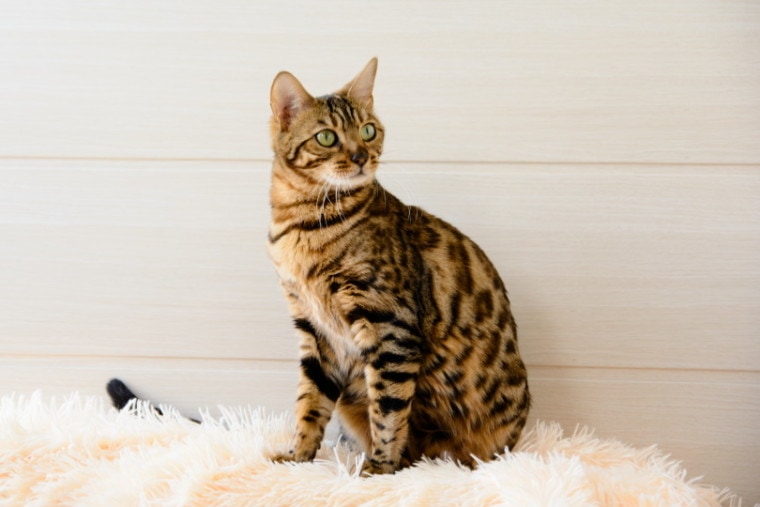
Click Below to Skip Ahead
If you’ve ever wanted to adopt a leopard, now you can! Bengal cats are domestic hybrid cats of the Egyptian Mau and the Asian Leopard cat. These spotted beauties are curious and playful, showing off their wild spirits in everything they do. Because of their wild heritage, these cats are not recommended for first-time cat owners as they can be hard to manage, even for experienced cat lovers!
Breed Overview
Height:
13 – 16 inches
Weight:
8 – 17 lbs
Lifespan:
10 – 16 years
Colors:
Brown spotted, seal lynx point, sepia, silver, mink
Suitable for:
Experienced cat owners
Temperament:
Intelligent, energetic, playful
If you’re sure you can handle their wild natures, these are great water cats for cat parents who want to play with their cats in the bath. Just like their Asian Leopard cat ancestors, Bengal cats love water and might take it upon themselves to follow you into the shower or bath to play with the water!
Bengal Cat Characteristics
Bengal Kittens
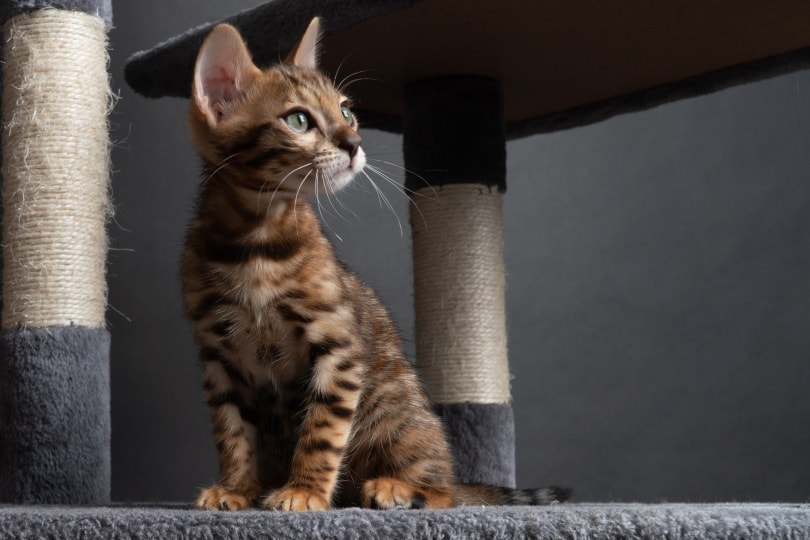
Bengal kittens are pretty expensive. Because of the restrictions that many states have on owning these cats, you may also have to pay licensing and inspection fees to own your cat legally, and since they aren’t endemic to the USA, you might have to pay to import one from another country as well.
Temperament & Intelligence of Bengal Cats
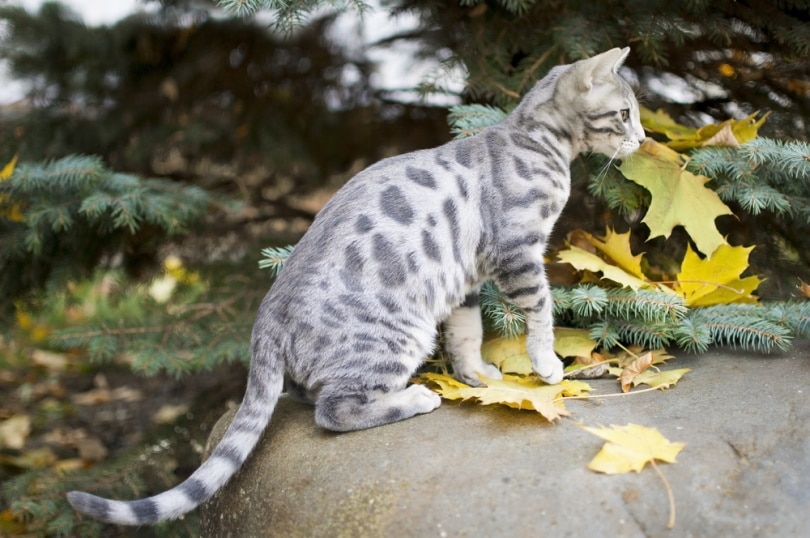
Bengal cats are brilliant and energetic. They learn fast, and many Bengal cat owners have reported their Bengals are natural retrievers who enjoy playing fetch. However, this intelligence can make them stubborn. They may challenge your authority and resist attempts to keep them in line.
Are Bengals Good for Families? 👪
Bengal cats are not recommended for families because they may still exhibit behavior reminiscent of a wild cat. They likely will not tolerate roughhousing and disrespect from young children, and their energy thresholds may be too high for them. While many cats will be gentle while your child learns to interact with them, Bengal cats will stand up for themselves if they feel they’re not being treated nicely.
Are Bengals Good with Other Cats?
Bengals are good with other cats who can stand up for themselves. Low-energy cats, tiny cats, and those who cannot defend themselves adequately might find themselves getting bullied by their Bengal siblings.
While it’s unlikely that your Bengal cat will intentionally bully your other cats, they’re medium-to-large breed cats with wild heritage, and their play may be too boisterous for their more thoroughly domesticated siblings.
Are Bengals Good with Other Animals?
Bengals have very high prey drives. Small animals should be kept safely out of reach of your Bengal, who might view them as a tasty snack rather than a sibling. Aquariums will need to be securely locked since Bengals will gladly dip their paws into your fish tank to torment or hunt your fish.
It’s important to remember that while Bengals are considered successfully domesticated, they are still generationally close to their wild ancestors and exhibit more wild behaviors like hunting and tracking.
Things to Know When Owning a Bengal Cat
Food and Diet Requirements 
Bengals will need a high-protein diet to keep up with their high energy. A high-quality diet made of natural meats will keep them energized and able to play with you all day (and night.) Because they’re medium-to-large cats, they may eat more than the average cat. As long as they aren’t gaining excess weight, it’s okay to feed your Bengal as much as they want to eat.
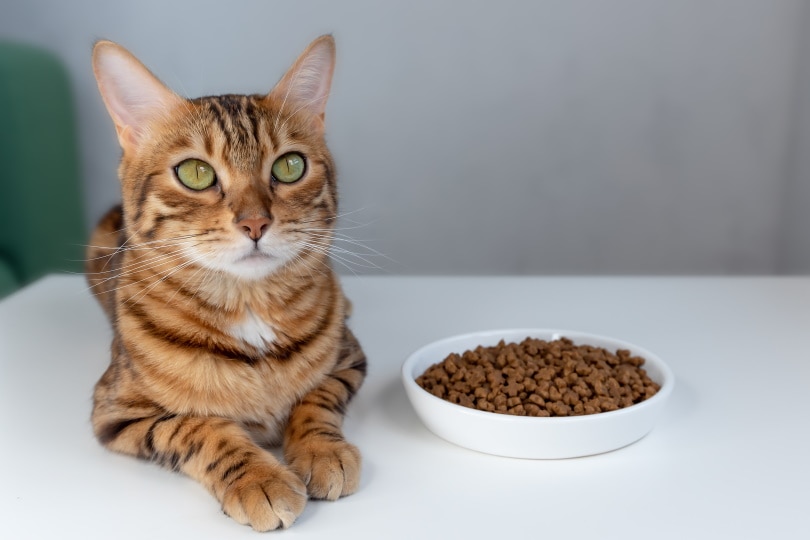
Exercise 🐕
Bengals need a lot of exercise to satisfy all their urges and energy. Providing them with big toys and playtime should be enough to keep them happy and mentally stimulated. Bengals will usually entertain themselves if they have the means.
Training 🧶
Bengals are very intelligent and learn quickly. Litter box training should be a breeze since naturally clean animals anyway. However, you’ll have to be firm with them since they’ll want to challenge your authority at every turn.
Since Bengals are so intelligent, it’s easy to teach them to do tricks, much like you would a dog. You’ll have to figure out what motivates your cat, but once you’ve figured out what makes them tick, you can get them doing tricks that will impress anyone!
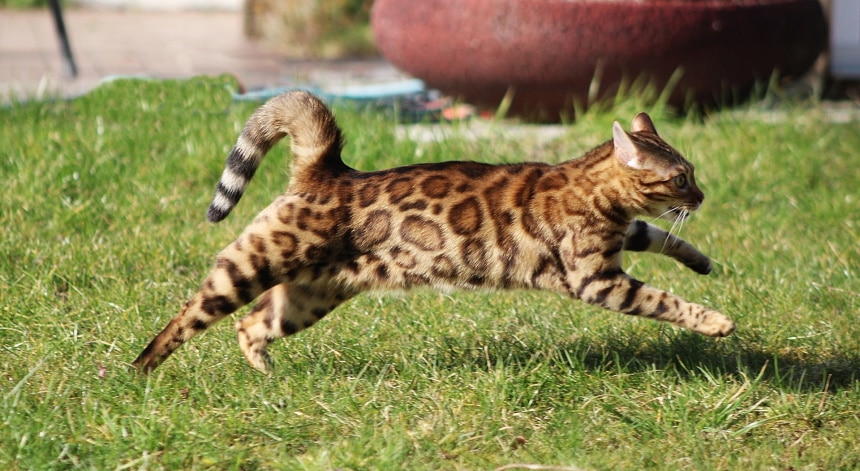
Grooming ✂️
Bengal cats do not have particularly intense grooming needs. They will mostly groom themselves, but a once-over with a de-shedding brush each day can help them stay on top of their coat maintenance and prevent hairballs.
You’ll want to regularly trim your Bengal’s nails so that they don’t become unwieldy or begin to groom their nails on your furniture.
Health Conditions 🏥
Because Bengal breeding has exploded in popularity, many low-quality breeders aren’t taking proper safety precautions when breeding cats. You’ll want to make sure your breeder can furnish you with a genetic report, as you would ask for when purchasing any purebred animal. A responsible breeder should be able to provide you with a report on not only the cat you’re planning to buy but also their parents.
Male vs Female
There are no notable differences between male and female Bengal cats.
The Legality of Owning a Bengal Cat
Because Bengal cats are so generationally close to their wild ancestors, many states classify them as wild-hybrid animals and restrict or forbid their ownership. Make sure you check your local laws before you start your search for a Bengal kitten to ensure you’re following all the legal procedures needed to give your Bengal a safe, loving forever home.
3 Little-Known Facts About the Bengal Cat
1. Bengal Cats Love Water
Asian leopard cats aren’t afraid of water as many desert cats are, and many Bengal cats have retained this part of their heritage. Bengal cats are known for following their owners into the shower or tub and jumping into pools of standing water to play.
However, this can make them especially dangerous to aquarium fish since they won’t be afraid to get their paws wet to fish out a new friend (or snack.)
2. They Used to Be Called Safari Cats
Their name was changed to Bengal cats to reflect the scientific name of the Asian Leopard cat, where their heritage lies.
3. Bengal Cats Bark
Bengal cats do not have a traditional meow. Their vocalizations are raspy and can resemble a bark more than a meow.
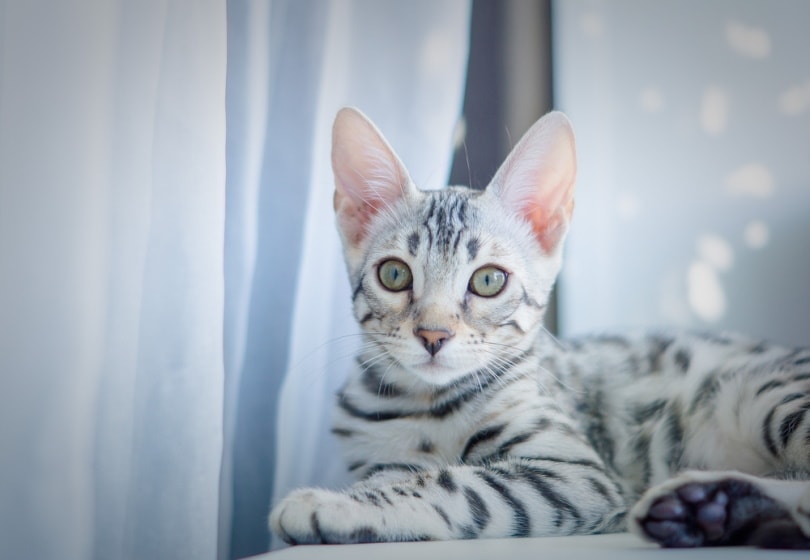
 Final Thoughts: Bengal Cats
Final Thoughts: Bengal Cats
Bengal cats are a popular exotic cat that is exploding worldwide. It’s hard not to fall in love with their playful and intelligent natures, and the uniqueness of these wild hybrids is part of the allure for most prospective owners. Before taking a Bengal cat into your life, it’s essential to ensure you’ll be able to handle the challenges that come with owning a wild hybrid animal.
Inexperienced cat owners may find themselves trying to control their Bengal cat at their wits’ end. It will be essential to understand cat psychology and behavior when bringing one of these gorgeous animals into your home.
It’s also important to read up on your local laws to ensure that you won’t face any legal trouble or repercussions for bringing the cat into your home. Wild hybrid animals are heavily regulated because they are hard to care for, and Bengal cats are no different!
Related Reads:
- Male Bengal vs Female Bengal Cat: Pictures, Differences, & What to Choose
- Bengal Cat Health Problems: 14 Common Concerns
- Can a Bengal Cat Purr? Is It Common Behavior?
Featured Image Credit: Elena Sonmez, Shutterstock






